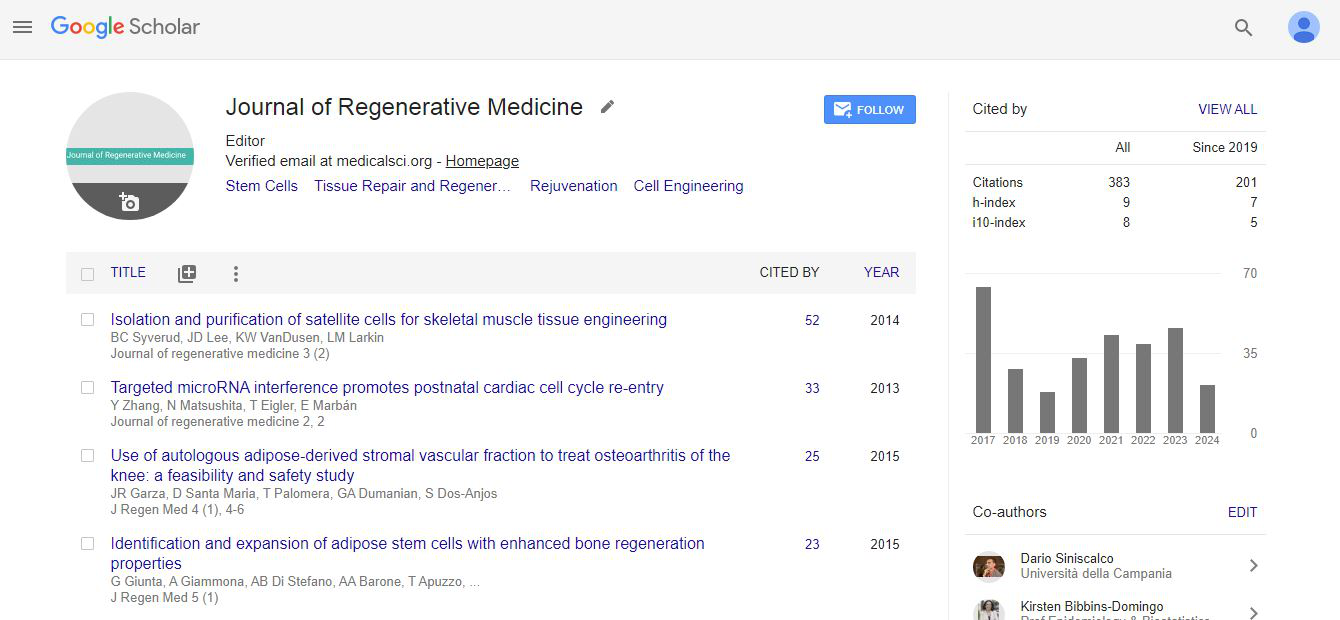Editorial, J Regen Med Vol: 1 Issue: 1
The Promise of Regenerative Medicine and Stem Cell Research for the Treatment of Autism
| Dario Siniscalco1,2,3*, James Jeffrey Bradstreet4 and Nicola Antonucci5 | |
| 1Department of Experimental Medicine, Second University of Naples, Italy | |
| 2Centre for Autism – La Forza del Silenzio, Caserta, Italy | |
| 3Cancellautismo – no profit association for autism care, Florence, Italy | |
| 4International Child Development Resource Center, Cumming, Georgia, USA | |
| 5Biomedical Centre for Autism Research and Treatment, Bari, Italy | |
| Corresponding author : Dario Siniscalco, ChemD, PhD Department of Experimental Medicine, Second University of Naples; via S. Maria di Costantinopoli, 16 - 80138 Napoli, Italy, Tel: +39 (0)81 5665880; Fax +39 (0)81 5667503; E-mail: dariosin@uab.edu | |
| Received: September 12, 2012 Accepted: September 14, 2012 Published: September 16, 2012 | |
| Citation: Siniscalco D, Bradstreet JJ, Antonucci N (2012) The Promise of Regenerative Medicine and Stem Cell Research for the Treatment of Autism. J Regen Med 1:1. doi:10.4172/2325-9620.1000e103 |
Abstract
The Promise of Regenerative Medicine and Stem Cell Research for the Treatment of Autism
Finding a cure for previously untreatable injuries and diseases is the main aim for the regenerative medicine. This promising medical field tries to restore or establish normal structure and function of damaged tissues and organs. To achieve this goal, a great opportunity is offered by stem cell therapy. Indeed, stem cells could represent the future of molecular and regenerative medicine. Using several types of stem cells is a real way to provide a valid approach to curing some untreatable human diseases. In addition, stem cell therapy is suitable for developing new cell-based drugs for the future molecular and regenerative medicine.
| Finding a cure for previously untreatable injuries and diseases is the main aim for the regenerative medicine. This promising medical field tries to restore or establish normal structure and function of damaged tissues and organs. To achieve this goal, a great opportunity is offered by stem cell therapy. Indeed, stem cells could represent the future of molecular and regenerative medicine [1]. Using several types of stem cells is a real way to provide a valid approach to curing some untreatable human diseases. In addition, stem cell therapy is suitable for developing new cell-based drugs for the future molecular and regenerative medicine [2]. | |
| Autism spectrum disorders (ASDs) are heterogeneous complex neurodevelopmental pathologies characterized by abnormalities in social interactions, with the presence of impaired communication, restricted interests, and repetitive stereotypic behaviours [3]. Prevalence rate of autism is quickly increasing [4]. Despite much research efforts, there are still no defined mechanisms of ASDs pathogenesis, rendering autism management very difficult, without defined standard approach [5,6]. Current pharmacological treatments are directed at the associated behavioural symptoms, without affecting all core symptoms of ASDs [7,8]. | |
| New perspectives for ASDs therapy are provided by stem cells [9]. Indeed, novel findings on the molecular, cellular, neuroimmunological, and environmental of ASDs suggest that stem cell therapy could be a unique and potent tool for the treatment of autistic syndromes [10,11]. | |
| Three properties defining stem cells make them potential therapeutic agents for ASDs. These characteristics are: 1) their selfrenewal ability with the capacity to generate more identical stem cells, 2) their capacity to give rise to more differentiated cells, and 3) their paracrine and regulatory functions [12]. Indeed, in ASDs treatment, the positive effects mediated by stem cells could be achieved through their paracrine and immunomodulatory properties [10]. Interestingly, ASDs are associated with severe immune alterations and pro-inflammatory cytokines overproduction. Stem cells are able to affect immune system cells, likely through secretion of large amounts of several biomolecules with anti-inflammatory properties (paracrine activity). In this way, they are able to counterbalance the immune system aberrant alterations and activate endogenous restorative mechanisms within damaged tissues contributing to recovery of function lost [10]. | |
| Before stem cell transplantation can become a successful reality for ASDs, researchers need to more complete and exhaustive investigations. Some issues on stem cell biology have to be further clarified: proliferative capacity, life span, senescence, exact stem cell dose, times and sites of injections, as well as eventual side effects and long term safety [9]. Besides several National State Country laws need to be modified to let autistic children to undergo to stem cell transplantation. | |
References
|
 Spanish
Spanish  Chinese
Chinese  Russian
Russian  German
German  French
French  Japanese
Japanese  Portuguese
Portuguese  Hindi
Hindi 